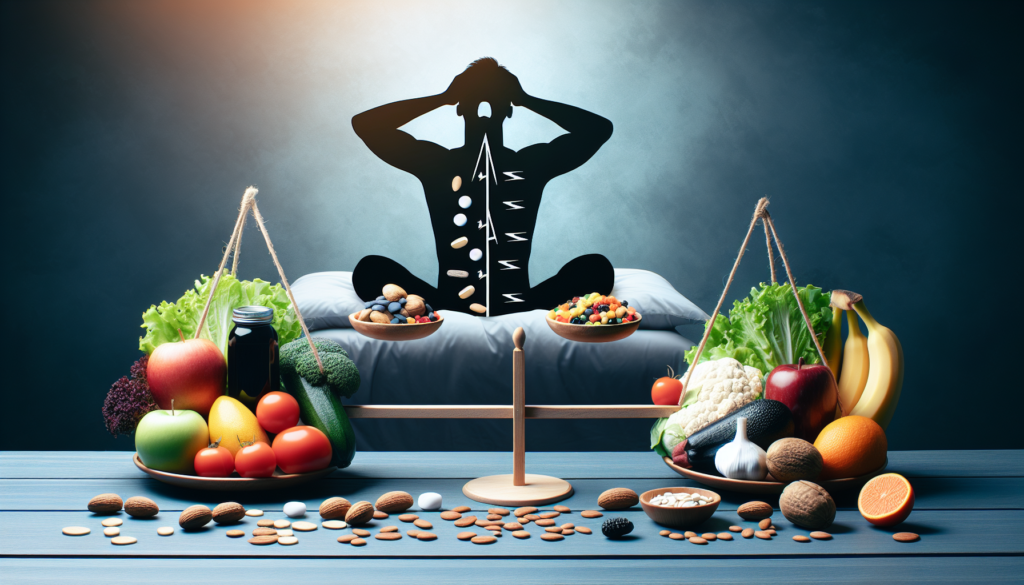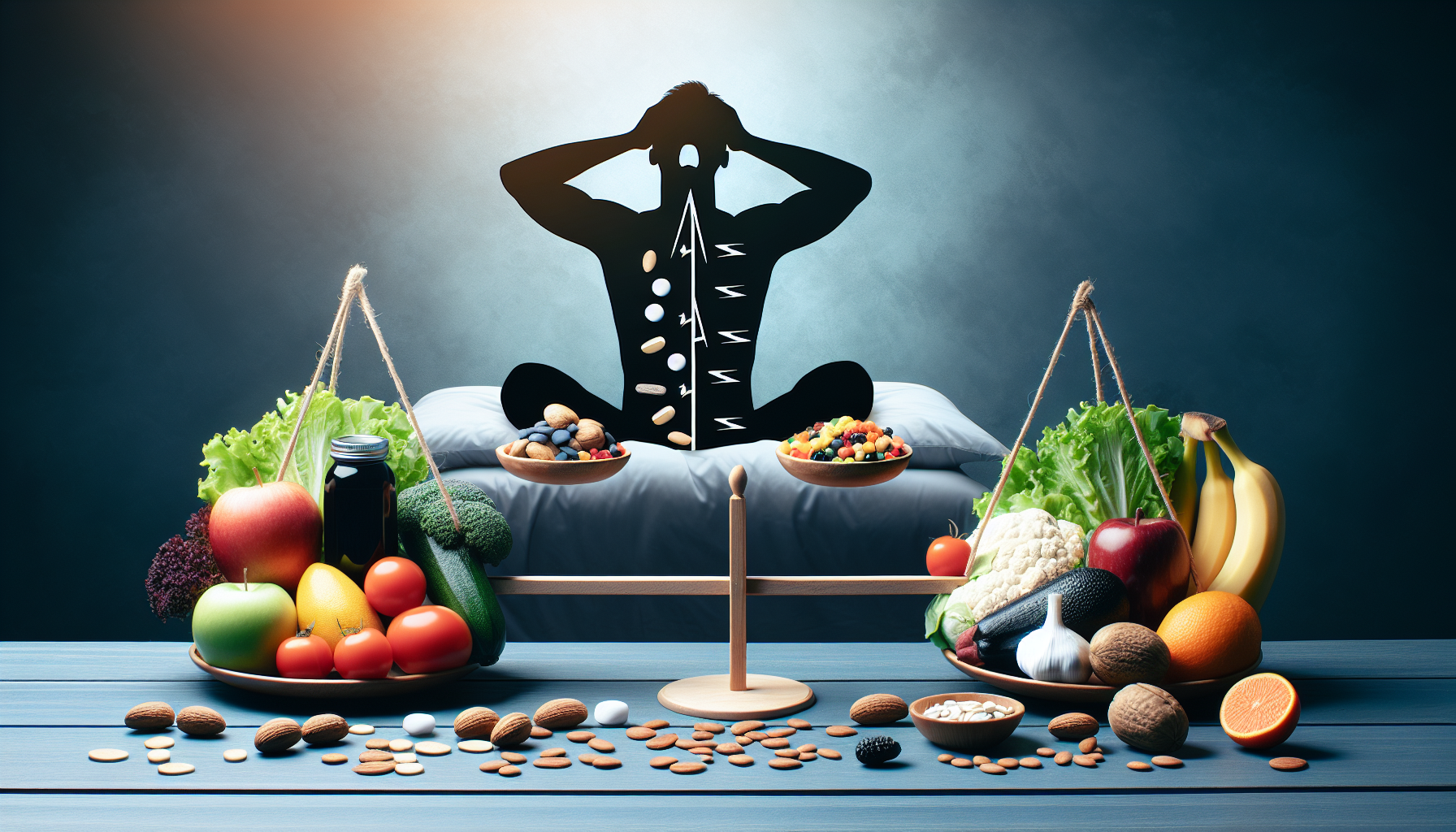Are you looking for ways to manage your narcolepsy symptoms through diet and nutrition? Look no further. In this article, we will provide you with valuable tips and guidelines to help you make informed choices about what you eat and drink. By incorporating these strategies into your daily routine, you can optimize your energy levels, improve your overall well-being, and better manage the challenges that come with living with narcolepsy. So let’s get started and unlock the power of food in supporting your health journey.
Importance of a Healthy Diet for Narcolepsy
Balancing Energy Levels
A healthy diet plays a crucial role in managing the symptoms of narcolepsy and maintaining optimal energy levels throughout the day. Making mindful choices about what you eat can help prevent sudden energy crashes and improve overall alertness and focus. By consuming the right combination of nutrients, you can better regulate your sleep-wake cycle and minimize daytime sleepiness.
Improving Alertness and Focus
Proper nutrition is key to improving alertness and focus for individuals with narcolepsy. Nutrient-dense foods provide essential vitamins, minerals, and antioxidants that support brain health and cognitive function. By giving your body the right fuel, you can enhance your ability to concentrate, think clearly, and stay engaged throughout the day.
Nutritional Recommendations for Narcolepsy
Adequate Hydration
One often overlooked aspect of maintaining good health, especially for individuals with narcolepsy, is proper hydration. Being properly hydrated is essential for optimizing cognitive function and supporting your body’s natural processes. Aim to drink at least 8 glasses of water per day, and adjust your intake based on factors such as physical activity and climate.
Balanced Macronutrient Intake
Balancing your macronutrients is important for sustaining energy levels throughout the day. Try to include a combination of carbohydrates, proteins, and healthy fats in each of your meals. Carbohydrates provide quick energy, while proteins and fats offer sustained energy and promote satiety.
Consuming Whole Foods
Choosing whole foods over processed options is key to maintaining a healthy diet for narcolepsy. Whole foods, such as fruits, vegetables, whole grains, and lean proteins, are rich in vitamins, minerals, and fiber, which can help regulate your body’s energy levels and promote overall well-being.
Choosing Quality Proteins
Protein is essential for repairing and building tissues, as well as for the production of neurotransmitters that support cognitive function. Opt for high-quality proteins like lean meats, fish, poultry, beans, legumes, and tofu. These sources provide essential amino acids and are lower in saturated fats, promoting healthy blood flow and brain function.
Focusing on Healthy Fats
Healthy fats, such as those found in avocados, nuts, seeds, and fatty fish like salmon, provide important nutrients for brain health. These fats support cognitive function and can help reduce inflammation in the body. Including healthy fats in your diet can also enhance the absorption of fat-soluble vitamins.
Including Fiber-Rich Foods
Fiber plays a crucial role in regulating blood sugar levels and promoting a healthy gastrointestinal system. Consuming fiber-rich foods, such as whole grains, fruits, vegetables, and legumes, can help prevent energy crashes and promote sustained energy throughout the day.
Managing Caffeine Intake
Caffeine can be a useful tool in managing excessive daytime sleepiness associated with narcolepsy. However, it is important to consume caffeine in moderation and be mindful of the timing. Consuming caffeine too close to bedtime can disrupt your sleep schedule, exacerbating symptoms of narcolepsy. Limit caffeine intake to the earlier part of the day and be mindful of its effects on your body.

Foods to Eat for Narcolepsy
Complex Carbohydrates
Complex carbohydrates are a great source of sustained energy. Opt for whole grains like brown rice, quinoa, and whole-wheat bread, as well as starchy vegetables like sweet potatoes and legumes. These foods provide a steady release of glucose into the bloodstream, helping to maintain stable energy levels throughout the day.
Protein-Rich Foods
Including protein-rich foods in your meals can help promote alertness and focus. Look for lean sources of protein like chicken, turkey, fish, eggs, dairy products, tofu, and legumes. Protein supports the production of neurotransmitters, such as dopamine and norepinephrine, which help regulate sleep-wake cycles and cognitive function.
Omega-3 Fatty Acids
Omega-3 fatty acids are essential for brain health and can help reduce inflammation in the body. Fatty fish like salmon, mackerel, and sardines are excellent sources of omega-3s. Alternatively, you can incorporate plant-based sources like flaxseeds, chia seeds, and walnuts into your diet.
Fruits and Vegetables
Fruits and vegetables are rich in vitamins, minerals, and antioxidants that support overall health and well-being. Include a variety of colorful fruits and vegetables in your meals to ensure you are getting a wide range of nutrients. Berries, leafy greens, citrus fruits, and cruciferous vegetables like broccoli and cauliflower are particularly beneficial for brain health.
Vitamin D
Narcolepsy has been linked to low levels of vitamin D, which plays a critical role in overall health and well-being. Incorporate foods rich in vitamin D, such as fatty fish, egg yolks, fortified dairy products, and fortified plant-based milk alternatives, into your diet. Alternatively, consider talking to your healthcare provider about vitamin D supplementation.
Foods to Avoid for Narcolepsy
Added Sugars and Refined Grains
Added sugars and refined grains can cause blood sugar spikes and crashes, leading to a decrease in energy levels. Avoid processed foods like sugary snacks, desserts, and sugary beverages, as well as refined grains like white bread, white rice, and pastries.
Processed Foods and Fast Food
Processed foods and fast food are often high in unhealthy fats, sodium, and artificial additives. These foods can contribute to inflammation in the body and may exacerbate symptoms of narcolepsy. Opt for homemade meals using fresh ingredients whenever possible to ensure you are providing your body with the nutrients it needs to function optimally.
High-Fat and Fried Foods
High-fat and fried foods can be heavy on the stomach and may lead to feelings of fatigue and sluggishness. Limit your intake of greasy foods like fries, chips, and fried meats. Instead, focus on healthier cooking methods like baking, grilling, steaming, or sautéing with minimal oil.
Excessive Alcohol Consumption
Alcohol can interfere with sleep quality and exacerbate symptoms of narcolepsy. It is best to limit or avoid alcohol altogether, especially in the evening or close to bedtime. If you do choose to drink, do so in moderation and be aware of its effects on your sleep.

Meal Planning Tips for Narcolepsy
Regular Meal Schedule
Establishing a regular meal schedule can help regulate your body’s internal clock and support stable energy levels throughout the day. Aim to eat breakfast, lunch, and dinner at consistent times and incorporate healthy snacks in between meals as needed to prevent energy crashes.
Balanced Meals
When planning your meals, aim for a balance of carbohydrates, proteins, and healthy fats. Balancing your macronutrients helps provide sustained energy and promotes satiety. Include a variety of fruits and vegetables to ensure you are getting an array of vitamins and minerals.
Mindful Eating
Practicing mindful eating can help you better recognize hunger and fullness cues. Take the time to sit down, eat slowly, and savor each bite. By paying attention to your body’s signals, you can better manage portion sizes and prevent overeating, which can lead to feelings of lethargy.
Optimizing Nutrient Timing
Consider optimizing the timing of your meals and snacks to support your body’s natural sleep-wake cycle. Aim to have your largest meal earlier in the day and consume lighter, easily digestible foods closer to bedtime. This can alleviate digestive discomfort and promote a more restful night’s sleep.
Supplements for Narcolepsy
Vitamin D
Supplementing with vitamin D may be beneficial for individuals with low levels of this essential nutrient. Consult with your healthcare provider to determine your vitamin D levels and discuss the appropriate dosage for your specific needs.
Omega-3 Fatty Acids
If you struggle to incorporate enough omega-3 fatty acids into your diet, consider taking a fish oil supplement. This can help support brain health and reduce inflammation in the body. As always, consult with your healthcare provider before starting any new supplements.
Melatonin
Melatonin is a hormone that regulates sleep-wake cycles. Supplementing with melatonin may help improve sleep quality and promote a more regular sleep schedule for individuals with narcolepsy. Speak with your healthcare provider about the appropriate dosage and timing for your specific needs.
Iron
Iron deficiency can contribute to feelings of fatigue and low energy levels. If you suspect you may have low iron levels, consult with your healthcare provider and consider iron supplementation. Your healthcare provider can help determine the optimal dosage and monitor your iron levels over time.
B vitamins
B vitamins, particularly B12 and folate, play a crucial role in energy production and brain function. If you have a deficiency in these vitamins, supplementation may be necessary. Consult with your healthcare provider to discuss your specific needs and determine the appropriate dosage.
Hydration and Narcolepsy
Importance of Hydration
Proper hydration is essential for overall health and well-being, including managing symptoms of narcolepsy. Dehydration can lead to feelings of fatigue, headaches, and decreased cognitive function. Make sure to drink enough water throughout the day to stay properly hydrated.
Daily Water Intake Recommendations
The recommended daily water intake varies depending on factors such as age, sex, activity level, and climate. As a general guideline, aim to drink at least eight 8-ounce glasses of water per day, or about 2 liters. However, individual needs may vary, so listen to your body and adjust your water intake accordingly.
Effect of Caffeine on Narcolepsy
Caffeine as a Mild Stimulant
Caffeine is a mild stimulant that can help increase alertness and reduce drowsiness. For individuals with narcolepsy, consuming caffeine in moderation can be beneficial in managing daytime sleepiness. However, it is important to be mindful of your caffeine intake and its potential impact on your sleep-wake cycle.
Limits and Recommendations
Limit your caffeine intake to moderate levels and be aware of how it affects your body. Consuming large amounts of caffeine, particularly later in the day, can disrupt your sleep schedule and worsen symptoms of narcolepsy. Aim to consume caffeine earlier in the day, giving your body enough time to metabolize it before bedtime.
Meal and Snack Ideas for Narcolepsy
Breakfast Ideas
- Greek yogurt with mixed berries and a sprinkle of nuts or seeds
- Oatmeal topped with sliced bananas, walnuts, and a drizzle of honey
- Veggie omelet made with egg whites, spinach, tomatoes, and feta cheese
Lunch and Dinner Ideas
- Grilled chicken or fish with steamed vegetables and quinoa
- Stir-fried tofu or shrimp with a variety of colorful vegetables and brown rice
- Turkey or black bean lettuce wraps with avocado, diced tomatoes, and a squeeze of lime
Healthy Snack Options
- Apple slices with almond butter
- Carrot sticks with hummus
- Trail mix with a combination of nuts, seeds, dried fruits, and dark chocolate
Lifestyle Tips to Support Narcolepsy Management
Regular Exercise
Regular exercise has numerous benefits for individuals with narcolepsy. Engaging in physical activity can help improve mood, promote better sleep quality, and increase overall energy levels. Aim for at least 30 minutes of moderate-intensity exercise most days of the week.
Stress Management
Stress can worsen symptoms of narcolepsy and interfere with sleep quality. Incorporate stress management techniques into your daily routine, such as practicing mindfulness, deep breathing exercises, or engaging in activities that you find relaxing and enjoyable.
Quality Sleep Hygiene
Establishing healthy sleep habits is crucial for managing narcolepsy. Stick to a consistent sleep schedule, create a calming sleep environment, and implement a relaxing bedtime routine. Avoid electronic devices close to bedtime and practice good sleep hygiene to promote quality sleep.
Mindful Eating
Practicing mindful eating can help you develop a healthier relationship with food and improve your overall well-being. Pay attention to hunger and fullness cues, savor each bite, and eat without distractions. By cultivating a mindful approach to eating, you can better support your body’s nutritional needs.
By incorporating these diet and lifestyle tips into your daily routine, you can better manage and minimize the symptoms of narcolepsy. Remember, it’s always important to consult with a healthcare professional or registered dietitian before making significant changes to your diet or starting any new supplements. With a balanced and nourishing approach to nutrition, you can optimize your energy levels and enhance your quality of life.
